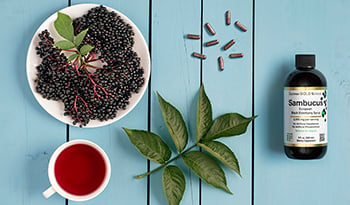6 Signs Your Immune System Could Use a Boost

There are physical signs that can serve as warning flags for you to take steps to address your immune health.
Your immune system could be weak if you notice any of the following:
1. You Get Frequent Infections
While it’s not unusual to catch a cold or two over the winter months, if you seem to be always catching the latest cold going around–or if your symptoms last longer than those around you – it may be a sign that your immune system needs some help.
Persistent or recurrent thrush, mouth ulcers, bladder infections, or fungal skin infections are possible signs, too.
The American Academy of Allergy, Asthma, and Immunology also outlines some red flags for consideration of an immunodeficiency disorder:
- More than four new ear infections in one year after age 4
- Recurrent pneumonia
- The occurrence of chronic sinusitis or more than three episodes of bacterial sinusitis in one year
- Requires preventive antibiotics to decrease the number of infections
- Common bacterial infections that develop into unusually severe infections
- An adult who needs more than two courses of antibiotics per year
2. You Suffer From Allergies
It’s certainly possible that you have a long-time condition like seasonal hay fever or an allergy to pet dander. But if you’re starting to frequently get watery eyes, joint aches, skin rashes, or bad reactions to food, you may want to take a closer look at your immune system function.
3. You Have Gut Issues
If you’re getting recurrent diarrhea, bloating, or constipation, there may be a problem with your digestive tract. There’s a tremendous number of immune cells residing in your gut. These cells form your gut-associated lymphoid tissue, or GALT, and represent about 70% of your immune system. So persistent digestive symptoms may point to an issue going on in the immune system.
4. Your Wounds Heal Slowly
If wounds on your skin are taking a longer time to heal than usual, your immune system may not be functioning as it should. Healthy immune cells are required for your skin to regenerate so that a wound can heal.
5. You’re Always Tired
There could be several reasons for your fatigue. Maybe you’re overstressed, overworked, or simply lacking enough sleep. Perhaps there’s a medical reason like anemia or hypothyroidism. But if you’ve tried getting extra sleep and you’re still feeling exhausted, then it could be that your body is trying to conserve energy to sustain a weakened immune system.
6. You’re Not Spending Much Time in the Sun
This isn’t really a sign—it’s more of a reason. But it’s still a situation you may be in that should alert you to the possibility that your immune system is weaker than usual. Your skin uses UV light from the sun to make vitamin D, an important regulator of your immune system. Moreover, research has shown that blue light found in sun rays directly activates key immune cells to move faster.
How to Strengthen a Weak Immune System
If you do see signs that your immune system is weak, then you should take appropriate action to restore your immune health.
Seek consultation with your healthcare provider to help you determine if there’s an underlying cause of your immune problem. There are also several strategies you can implement to improve the function of your immune system.
Eat a Healthy Diet
Your entire body depends on good nutrition and that includes your immune system. Avoid processed and fried foods as they tend to be more inflammatory. Limit your consumption of added sugars. Not only does sugar trigger a cascade of inflammation in your body, it can also suppress certain immune responses. Studies have shown that consuming sugar can slow the ability of white blood cells to engulf bacteria and the effect can last for a few hours.
Focus on a whole foods diet. Eat plenty of fruits and vegetables as their polyphenol content can help reduce inflammation and enhance your immune response. Learn more about polyphenols.
Get Adequate Exercise
There is ample evidence that the immune system benefits from regular physical activity. Exercise increases the production of macrophages, the immune cells that target and destroy harmful organisms like viruses and bacteria. It also supports your blood circulation, improving the flow of lymphatic fluid. This fluid is what travels through your tissues to remove unwanted substances like toxins, bacteria, and waste products. Moreover, exercise triggers the release of endorphins in your body to help relieve stress.
It’s important not to overtrain, as that can cause some immune suppression. If you already have a weak immune system, you should be even more careful to avoid exercising too frequently or too intensely. Remember to get sufficient recovery time in between workouts as well. If you’re feeling very thirsty all of the time, experiencing more fatigue than usual, or having muscle aches that last beyond the usual 1-2 days of delayed onset muscle soreness, then you may want to throw in a day of rest or back off your exercise intensity.
Get Deep, Restorative Sleep
According to the Centers for Disease Control and Prevention, adults should aim to get at least seven hours of sleep each night. Inadequate sleep increases inflammation and impairs your body’s ability to combat infection.
Dr. Anne Kennard, board-certified OB/GYN fellowship-trained in integrative medicine, believes deep, restorative sleep can be achieved through very intentional habits. Her tips? “Turning off electronics several hours before bed; keeping [electronics] out of the bedroom; keeping the room dark and cool; waking and sleeping at the same time approximately every day; getting outside in some of the morning hours just to get natural melatonin production to be an appropriate circadian rhythm.” Dr. Kennard explains that these are habits that promote good sleep hygiene.
Relieve Stress
Chronic stress causes increased inflammation in the body. It can also decrease the supply of immune cells that help our bodies combat infection. Researchers have found that people who are stressed are more susceptible to developing the common cold.
There are many stress relief techniques you may try:
- Yoga
- Meditation
- Deep breathing exercises
- Keeping a gratitude journal in which you write down what makes you feel grateful each day
- Talking with a supportive friend or family member
Soak Up Some Sun
If spending too much time indoors was one of the signs that alerted you that you could have a weak immune system, then you may already recognize the need to go outside more often. As already described, the sunlight stimulates the production of vitamin D, an important vitamin for immune health, and energizes cells involved in the immune response.
Of course, always use caution and avoid the health dangers of prolonged sun exposure. Aim to be in the sun for 15-20 minutes each day and wear sunscreen.
Check Your Vitamin D Level and Optimize It
Vitamin D is one of the most important vitamins that contribute to your immune health.
When testing for vitamin D, the form that is measured is 25-hydroxycholecalciferol (or 25-hydroxy vitamin D). Veronica Anderson, MD, an integrative physician certified in functional medicine, says that for most labs, the lower limit of normal is 30 ng/mL. But she explains, “Optimal [level] tends to be 60-100 [ng/mL] in range.”
Get Enough Vitamin C
For people under increased physical stress, vitamin C has been shown to decrease the risk of developing the common cold by 50%. While this reduced risk has not been seen in the average population, studies have found that regular supplementation of at least 200mg of vitamin C may help decrease the duration of the common cold or lessen the severity of symptoms.
Consider Herbal Foods and Supplements
While it may be tempting to find some “immune system boosters” to help the cause, a boost is not always the best course of action. There are times when your immune response needs to be stimulated and there are other times when it should be kept in check. There are certain foods and supplements, however, that can help get your immune system to a level where it is functioning as effectively as possible.
Adaptogens
Adaptogens are plants that have been used for centuries in Chinese and Ayurvedic medicine. To be considered an adaptogen, a plant must be non-toxic. It must have non-specific activity such that it “normalizes” bodily functions, regardless of the direction of change from the norm caused by the stressor. So it must be neither a stimulant nor a sedative. It should also enhance the general resistance of the body, decreasing the sensitivity to stressors.
Dr. Veronica explains, “Adaptogens really help lower stress levels from an emotional standpoint and help your body cope from a [physical] standpoint, as well as modulate your immune system.” Adaptogens she recommends for immune health include Rhodiola, ashwagandha, American ginseng, and Siberian ginseng.
Melatonin
Melatonin is a hormone that your body produces when darkness falls, signaling the body to prepare for sleep. “Melatonin not only is an antioxidant and inhibits inflammation,” says Dr. Kennard, “but it’s also been shown to reduce oxidative lung injury and inflammation in the setting of pulmonary disease.” For all of those reasons Dr. Kennard believes it would be prudent to consider a melatonin supplement.
Turmeric
Turmeric contains curcumin, a compound that has been shown to reduce inflammation in the body. Dr. Kennard feels it is especially appropriate for use during cold and flu season. “It will reduce viral attachment, replication, and activation,” she says, “and it also suppresses the key cytokines.” Cytokines are proteins released by the body which coordinate the immune response to infection. A cytokine storm is a complication when the immune response goes into overdrive.
Before you make any dietary or physical activity changes, it’s always wise to seek the counsel of your healthcare provider. Having the right team of health professionals and product suppliers is important to guide your path to optimal immune health.
DISCLAIMER:This Wellness Hub does not intend to provide diagnosis...














































































 Table of Contents
Table of Contents
















